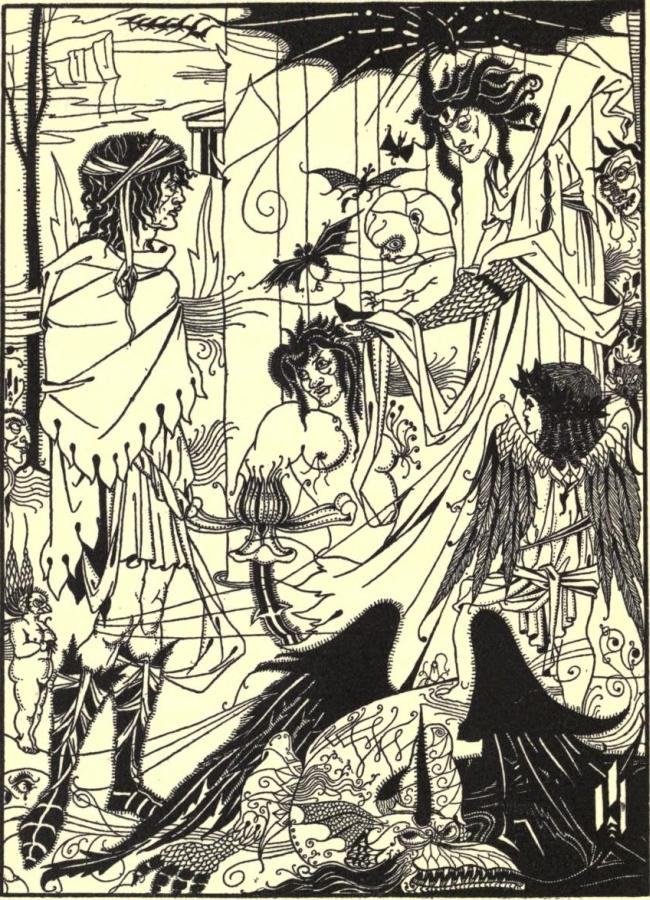 Lucian seems to have been the Kurt Vonnegut of the Roman World, poking fun at philosophers and the classics of Greek literature with a cheerful cynicism. Though he was an Assyrian from Mesopotamia, living in the second century A.D., he wrote in Classical Greek (the equivalent of someone today writing in Elizabethan English). His most famous work is the True History, sometimes listed as the first science fiction story, since it incorporates a trip to the moon and the sun, and an interplanetary war. But it’s really a shaggy-dog story intended to spoof the credulity of Homer and Herodotus. The narrator repeatedly tells you something absurd, then says he won’t tell you another, more absurd detail because you won’t believe him. It employs techniques of farce and burlesque later perfected by Baron Münchausen and Mark Twain. Lucius the Ass, the attribution of which is occasionally questioned, is noticeably different in style, and contains passages that are obviously intended to be read as porn. The same story (the hero is transformed into a donkey: trouble follows) was also told by Apuleius. It’s interesting in that it draws attention to the suffering of an animal, something to which most Roman writers were oblivious. Most of the other pieces are comic dialogues in which the Gods are spoofed in all-too-human terms. Lucian seems to have considered all religion charlatanism, and did not have much good to say about philosophers, either. Christians are satirized in The Death of Peregrinus. The autobiographical My Dream reveals that a stone-mason’s son from a backwater part of the Empire could educate himself into a success. Lucian was able to settle down and write spoofs after a career as a lecturer that took him across the Empire. A modern reader with a routine exposure to Greek mythology will get at least half of Lucian’s allusions, though not, of course, his puns. This anthology contains less than half of his known works.
Lucian seems to have been the Kurt Vonnegut of the Roman World, poking fun at philosophers and the classics of Greek literature with a cheerful cynicism. Though he was an Assyrian from Mesopotamia, living in the second century A.D., he wrote in Classical Greek (the equivalent of someone today writing in Elizabethan English). His most famous work is the True History, sometimes listed as the first science fiction story, since it incorporates a trip to the moon and the sun, and an interplanetary war. But it’s really a shaggy-dog story intended to spoof the credulity of Homer and Herodotus. The narrator repeatedly tells you something absurd, then says he won’t tell you another, more absurd detail because you won’t believe him. It employs techniques of farce and burlesque later perfected by Baron Münchausen and Mark Twain. Lucius the Ass, the attribution of which is occasionally questioned, is noticeably different in style, and contains passages that are obviously intended to be read as porn. The same story (the hero is transformed into a donkey: trouble follows) was also told by Apuleius. It’s interesting in that it draws attention to the suffering of an animal, something to which most Roman writers were oblivious. Most of the other pieces are comic dialogues in which the Gods are spoofed in all-too-human terms. Lucian seems to have considered all religion charlatanism, and did not have much good to say about philosophers, either. Christians are satirized in The Death of Peregrinus. The autobiographical My Dream reveals that a stone-mason’s son from a backwater part of the Empire could educate himself into a success. Lucian was able to settle down and write spoofs after a career as a lecturer that took him across the Empire. A modern reader with a routine exposure to Greek mythology will get at least half of Lucian’s allusions, though not, of course, his puns. This anthology contains less than half of his known works.
contains:
17114. (Lionel Casson) Introduction [preface]
17115. (Lucian of Samosata) My Dream [Περὶ τοῦ Ἐνυπνίου ἤτοι Βίος Λουκιανοῦ; Somnium]
17116. [2] (Lucian of Samosata) A True Story [Ἀληθῶν διηγημάτων; Verae Historiae]
[a portion read at 3786, and a different translation of full version read at 4705]
17117. (Lucian of Samosata) Lucius, the Ass [Λούκιος ἣ Ὄνος; Asinus] [attr. to Lucian contested]
17118. (Lucian of Samosata) Dialogues of the Gods [Θεῶν Διάλογοι;Dialogi Deorum]
17119. (Lucian of Samosata) Dialogues of the Sea-Gods [Ἐνάλιοι Διάλογοι ; Dialogi Marini]
17120. (Lucian of Samosata) Prometheus [Προμηθεύς]
17121. (Lucian of Samosata) Zeus the Opera Star [Ζεὺς Τραγῳδός; Zeus Tragoedus]
17122. (Lucian of Samosata) A Voyage to the Underworld [Κατάπλους ἣ Τύραννος; Cataplus]
17123. (Lucian of Samosata) Dialogues of the Dead [Νεκρικοὶ Διάλογοι; Dialogi Mortuorum]
17124. (Lucian of Samosata) Charon [Χάρων ἣ Ἐπισκοποῦντες]
17125. (Lucian of Samosata) Timon [Τίμων]
17126. (Lucian of Samosata) Alexander the Quack Prophet [Ἀλέξανδρος ἣ Ψευδόμαντις]
17127. (Lucian of Samosata) Dialogues of the Courtesans [Ἑταιρικοὶ Διάλογοι; Dialogi Meretricii]
17128. (Lucian of Samosata) Philosophies for Sale [Βίων Πρᾶσις ; Vitarum Auctio]
17129. (Lucian of Samosata) The Fisherman [Ἀναβιοῦντες ἣ Ἁλιεύς ; Piscator]
17130. (Lucian of Samosata) The Death of Peregrinus[Περὶ τῆς Περεγρίνου Τελευτῆς ; De Morte Peregrini]
0 Comments.